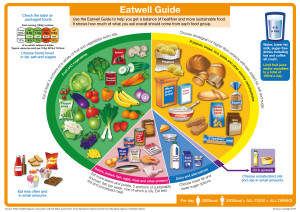01 Apr EIGHT TIPS FOR HEALTHY EATING
Food that is starchy carbohydrates should make up just over one third of the food you eat. These include potatoes, bread, rice, pasta, cereals. Try and choose wholegrain foods as they contain more fibre and can help you feel full for longer. Try to include at least on starchy food with each main meal. Be careful with fats you add in cooking or serving as this increases the calorie content.
Fruit and Vegetables
It is recommended that we eat at least five portions of a variety of fruit and vegetables every day. A 150 ml glass of unsweetened 100% fruit juice of smoothie can count as one portion.
Fish
Aim to eat at least two portions of fish a week, including at least on portion of oily fish which contains omega-3 fats and help to prevent heart disease. You can choose fresh, frozen and canned. Canned and smoked fish can be high in salt.
Saturated and Unsaturated Fat
Cut down on saturated fat and sugar. Everyone needs check the type of fat we are consuming. There are two main types; saturated and unsaturated. Too much saturated fat can increase your cholesterol and increase your risk of developing heart disease. The average man should have no more than 30g saturated fat per day and the average woman no more than 20g. Children should have less than adults. Choose unsaturated fats such as vegetable oils, oily fish and avocados.
Sugar in our Diet
Drinks high in sugar increase your risk of obesity and tooth decay. Many packaged foods and drinks contain high amount of free sugars. Cut down on sugary fizzy drinks, alcoholic drinks, sugary breakfast cereals, cakes, biscuits and pastries. Food labels can help to check sugar amounts. More than 22.5g of total sugars per 100g means the food is high in sugar; 5g or less per 100g means the food is low in sugar.
Eat Less Salt
No more than 6g a day for adults. Eating too much salt can raise your blood pressure and can cause heart disease or a stroke. About 3/4 of the salt we eat is already in the food we buy so be careful adding salt to your food. More than 1.5g of salt per 100g means the food is high in salt. Adults and children over 11 should eat no more than 6g of salt (about a teaspoonful) per day.
Get active and be a healthy weight
You should eat a healthy, balanced diet to maintain a healthy weight. Being overweight and underweight can affect your health. If you want to lose weight, you need to eat fewer calories. Remember that alcohol is also high in calories, so cutting down can help weight control.
Don’t get thirsty
We need to drink plenty of fluids to stop us getting dehydrated. The government recommends 6-8 glasses every day. This includes all non-alcoholic drinks such as tea, coffee, but water and lower-fat milk are healthier options. Try to avoid sugary soft drinks. Even unsweetened fruit juice and smoothies are high in free sugar, so it is recommended to drink only a 150ml glass of fruit juice per day.
Don’t skip breakfast
Some people skip breakfast because they believe it helps to lose weight. Research shows that eating breakfast can help to control their weight. A healthy breakfast forms part of a balanced diet and includes some of the vitamins and minerals we need for good health.
The key to a healthy diet
Eat the right amount of calories for how active you are :
- Men should have around 2,500 calories per day
- Women should have around 2,000 calories per day
Most adults are eating more calories than they need and should eat fewer calories. Eat a wide range of foods to ensure you are getting a balanced diet.




No Comments